- Home
- Charlaine Harris
(LB2) Shakespeare's Landlord Page 5
(LB2) Shakespeare's Landlord Read online
Page 5
Then Alvah cried.
“But he got convicted,” I said.
“Yes,” Alvah said. “He cried and screamed and said he’d got the Lord. It didn’t do him a bit of good; he got convicted. But he’ll get out, less someone kills him in prison, which is what I pray for, though the Lord may damn me for it. They say that other prisoners don’t like rapists or child molesters. Maybe someone will kill him some night.”
I recognized the tone, the words. I had to fight panic hard for a second. I was grateful for Alvah’s absorption in her own troubles. My hand went up to my chest, touched the light yellow of my T-shirt, felt the ridges of the scars underneath it.
“Alvah, all I can do is clean,” I said.
“Well, let’s do that,” Alvah said shakily. “We might as well.”
For three hours, we worked in the small apartment, cleaning things that had never been dirty and straightening things that had never been messy. Alvah likes her life streamlined—she would live well on a boat, I’ve always thought. Everything superfluous was thrown away ruthlessly; everything else was arranged logically and compactly. I admire this, having tendencies that way myself, though I’m not as extreme as Alvah. For one thing, I reflected as I wiped the cabinets in the bathroom, Alvah has such limited interests that cleaning is one of her few outlets for self-expression. Alvah does a little embroidery of an uninspired kind, but she doesn’t read or sew and is not particularly interested in cooking or television. So she cleans.
Alvah is a warning to me.
“What about the camper?” I asked when I thought we were almost through with the apartment.
“What?” Alvah said.
“We usually do the camper, too,” I reminded her. The Yorks have a camper they pull behind their pickup truck, and when they visit their daughter, they park in her driveway and live in the camper. They can make their own coffee in the morning, go to bed when they feel like it, they’ve often told me. I’d been remembering while I worked how may times the Yorks had mentioned their granddaughter Sarah; youngest of their daughter’s children, Sarah had been spoiled and had just last year made a bad marriage to a boy as young as she. But the Yorks have always doted on Sarah.
“You remember all the arguments Pardon gave us about that camper?” Alvah asked unexpectedly.
I did indeed. At each end of the residents’ parking garage is a space about car width between the wall of the garage and the surrounding fence. The Yorks had asked permission to park their camper in the north space, and initially Pardon had agreed. But later, he’d reneged, insisting it stuck out and inconvenienced the other residents.
It had never been my business, so I’d paid little attention to the whole brouhaha. But I’d heard the Yorks carry on about it, and I’d seen Pardon standing out in the parking area, shaking his head at the camper as if it were a difficult child, puttering around it with a yardstick. Pardon Albee had been a fusser, a man apparently unable to let anything be.
He would never let a sleeping dog lie.
Now Alvah was weeping again. “You’d better go, Lily,” she said. “This whole thing has just got me where I don’t know if I’m going or coming. These past few days, when we were there for the trial, they have just been like hell. I’ll do better next week.”
“Sure, Alvah,” I said. “Call me when you want to get your curtains back up, or if you want to clean the camper.”
“I’ll call you,” Alvah promised. I didn’t remind her that I hadn’t been paid; that was an indicator, too, since Alvah is always scrupulous about paying me on the dot.
I can always drop back by tomorrow, I thought. By then, perhaps some of the shock of Murrell’s trial would have worn off.
Of course, Sarah’s suffering would continue, for weeks and months and years….
I realized it for sure wasn’t my day as I was leaving the building. Deedra Dean came in the front door before I could get out of it.
I can’t stand Deedra, especially since our conversation last week. We’d been standing right inside Deedra’s upstairs apartment door. Deedra had come home for lunch and was ready to return to Shakespeare City Hall, where she almost earns a living as an office clerk.
“Hi, housekeeper!” Deedra had said chirpily. “Listen, I been meaning to tell you…last week I think you forgot to lock the door behind you when you left.”
“No,” I had said very firmly. Reliability is very important in my work, maybe even more important than doing an impeccable cleaning job. “I never forget. Maybe you did, but I didn’t.”
“But last Friday, when I came home, my door was unlocked,” Deedra had insisted.
“I locked it as I left,” I’d insisted right back. “Though,” I’d added, struck by a sudden recollection, “Pardon was on his way up the stairs as I was coming down, and of course he has a master key.”
“Why would he go into my apartment?” Deedra had asked, but not as if the idea was so ridiculous. As it sunk in even further, Deedra’d looked…well, a strange combination of angry and uneasy. I’d been intrigued by the sight of thought processes echoing through Deedra’s empty head.
Deedra Dean, Deedra of the shiny blond hair, voluptuous figure, and a face completely undermined by its lack of chin. Deedra is always brightly made up and maniacally animated to distract the eye from that damning absence. Deedra moved into the apartment building three years ago and had screwed every male who had ever lived in the building except (maybe) Pardon Albee and (almost certainly) T. L. York. Deedra’s fond mother, a sweet, well-to-do widow who recently remarried, subsidizes Deedra heavily. Lacey Dean Knopp is apparently under the impression that Deedra is dating around until she finds Mr. Right. To Deedra, every man is apparently Mr. Right, for a night or two, anyway.
I’ve told myself often that it isn’t any of my business, and I’ve wondered why Deedra’s habits infuriate me. Gradually, I’ve come to the conclusion that Deedra’s total lack of self-respect dismays me, Deedra’s risk taking frightens me, and the ease with which Deedra has sex makes me envious.
But as long as I get paid on time by Deedra’s mama, I keep reminding myself every ten minutes that Deedra is an adult, nominally at least, who can arrange her life as she chooses.
“Well, just don’t let it happen again,” Deedra had lectured me last week, with a lame attempt at sternness, after she’d accused me of leaving the door unlocked. Even Deedra’s feeble brain had finally registered my anger. “Oh, gotta run! I had to come back to get my insurance card. I’ve got to get my car inspected on my lunch hour and get that tag renewal notice in the mail.”
I’d wanted to say something to Deedra about her lifestyle, something that would make a difference, but I knew nothing I could say would make an impression. And it was truly none of my business; Deedra was supposed to be grown up. I’d watched out the window as Deedra hurried from the front door to her red sports car, left idling at the curb. Deedra’s mother had made the down payment on that unreliable but flashy car; Deedra’d told me that quite casually.
“Did you ever find out if Pardon had been in your apartment?” I asked today. There was no one else in the ground-floor hall, and I kept my voice low. I had been following my own train of thought so intently, I’d forgotten that Deedra might be thinking of something quite different, and she looked at me now as if I was a very peculiar person.
“No,” she said fiercely. I raised my eyebrows and waited. “And you better not tell the police you talked to me about that, either!”
“Oh?”
“You won’t get any work in Shakespeare ever again,” Deedra threatened. “I don’t want to be involved in that old bastard getting killed.”
“Do you seriously think,” I said, one side of my mouth curling up in a very dry smile, “that anyone in this town would give up an excellent and reliable maid like me to protect your hide?”
Deedra’s blue eyes widened in shock. A door opened on the second floor, and down the stairs came the Garden Apartments’ only black tenant, Marcus Jefferson. Marcu
s, a handsome man in his late twenties, gave us a startled look, muttered a greeting, and pushed past us to the front door, which gave its heavy groan as it inched shut behind him.
This building was full of people behaving peculiarly today. When I looked back at Deedra, her face was brick red and she was watching the front door close on Marcus Jefferson.
Uh-oh. I had a flash of what might have finally prodded Pardon Albee into “doing something” about Deedra.
“Did you want me to come back on my regular day?” I asked. Perhaps Deedra didn’t want my services anymore. I clean Deedra’s apartment on Friday mornings. That is prime time, since everyone wants a house clean for the weekend, and I half-hoped Deedra would fire me.
“Oh…oh, yes. Listen, really, let’s just forget all about that conversation we had last week, about the door. I left it unlocked, okay? I just remembered it later. I’m sorry I even thought you might have done it. You’re just the most reliable…” Deedra’s voice trailed off, a phony smile pasted to her face, where it looked quite at home.
AS I WALKED down the sidewalk to my own house, I wondered if Pardon had indeed been in Deedra’s apartment the week before. What would he go in there for? What would he have found if he did?
If he was looking for trash on how Deedra lived her private life, he’d have found plenty. In her top dresser drawer, Deedra keeps some pornographic pictures some lover had taken of her in exotic lingerie and some of her naked. I certainly hadn’t wanted to know this little fact, but Deedra expects me to do her wash and put it away during the afternoon I spend cleaning the apartment, and that drawer is her lingerie drawer. Deedra also keeps some erotica and some ghastly magazines actually stuck under the bed (where I am obliged to vacuum), and of course the sheets are always a mess. There are probably other “incriminating” things there, too, things Deedra’s mother might be interested to know about.
Would Pardon Albee actually have dared to call Deedra’s mother, the very proper Lacey Dean Knopp?
By God, that would be just like him.
FIVE MINUTES AFTER I had entered my own house, the doorbell rang. I checked my peephole and opened the door.
My visitor was surprising but nonthreatening—my seldom-seen neighbor, Carlton Cockroft. I’ve spoken to Carlton only three or four times a year since I bought the house.
There is something very “edible” about Carlton. He always reminds me of hot chocolate and caramels in the winter, or the coconut smell of tanning lotion and the tang of barbecue in the summer. Carlton is in his early thirties, like me. He has black hair and dark brown eyes, a cleft chin, and thick arched brows. He smells good. He is maybe four inches taller than I am, about five ten. My neighbor is polite, busy, and heterosexual—and that is the sum total of my knowledge.
“Hello, Lily,” he said, his voice pleasant but not cheerful.
“Carlton.” I nodded in greeting, then opened my door so he could step inside.
He looked very surprised, and I realized I’d never asked him in before. He looked at the room very quickly and didn’t seem to know what to do with himself, quite unlike my assured visitor of the day before.
“Have a seat,” I said, taking the wing chair.
“Lily, I’ll come straight to the point,” Carlton began after he’d settled himself on the love seat. He leaned forward, putting his elbows on his knees. He was wearing an unremarkable plaid shirt in navy blue and white, pleated blue jeans, and Reeboks; he looked informally prosperous and comfortable.
I waited for him to come straight to the point. Most people seem to think you should respond when they tell you they’re about to do something, but I’ve always thought it more interesting to wait and see if they actually do it.
He kept his eyes on me for a moment, as if expecting something from me, sure enough.
I made an open-hands gesture—okay, the point?
“I saw you out walking the night of the murder.” He waited for me to shriek in alarm. “I got up to get a sinus pill.”
I shrugged. “So?”
“Lily, that puts you in a bad position. I didn’t tell Friedrich, but he asked me an awful lot of questions about you. If anyone else saw you, I’m afraid he may even suspect you of having something to do with Pardon’s death.”
I thought for a moment, my hands folded on my lap.
“So, why are you here?” I asked.
“I just wanted to warn you,” Carlton said, straightening from his intent-but-relaxed pose. “I’ve always worried about you some.”
My eyebrows flew up.
“Yes, yes, I know,” he said with a little smile. “None of my business. But you’re a woman alone, a pretty woman, and since I live next to you I feel a little responsible…. I sure don’t want anything bad to happen to you.”
I felt a terrible impulse to pull up my shirt and let him have a good look. The bad thing, the worst thing, had already happened to me. But I knew he was trying to shelter me, shield me from harm. I knew that Carlton perceived that as the right stance for a man to take. And I thought, as I so often do when dealing with them, that men are frequently more trouble than they’re worth.
“Carlton, I live next to you, and since you’re a good-looking guy living alone, I feel responsible for you,” I said.
Carlton turned red. He started to get up, restrained himself. “I guess I deserved that. I should have turned it around in my own head to hear how it sounded, before it came out. But dammit, Lily, I’m trying to be your friend.”
“I see that, Carlton, but why do you feel responsible for my possible trouble with the police? How do you know I’m not guilty of killing Pardon?”
My handsome neighbor looked at me as if I’d grown a snake’s head and hissed. He was hurt, his gallant impulse rebuffed.
“Well…” he began stiffly, “well…I’ve just wasted my time. And yours.”
I looked down at my right hand; my ring-finger nail had an aggravating notch in it. I’d have to get out my emery board before it got worse.
He said unbelievingly, “I’m trying to be nice to you.”
I looked up at him steadily, debated whether or not to speak. “Carlton, you’ve dated too many women who thought you were just what they were looking for,” I said.
I had observed the parade to and from his little house for four years. A good-looking guy with no visible vices and a steady income in a town this size? USDA prime.
“But thanks for not telling the police you saw me. As it happens, I don’t know who killed Pardon, and I’d rather not spend a lot of time convincing the police of that.”
I thought I’d been fairly agreeable. But Carlton said, “Good-bye, Lily,” and stalked out in a huffy way. He remembered just in time not to slam the door behind him.
As I went to get my emery board, I shook my head. There was a good guy in there somewhere under a few layers of crusted manure. I wondered how Carlton had imagined his visit would go.
“Lily, I’m the handsome male next to you and I’m showing you by my silence that I’m gallant and dependable. You should develop a crush on me.”
“Thank you, hunk who has never noticed me before. I was out late at night on a mysterious but innocent errand. I am truly not the peculiar person I sometimes seem, and I am so grateful you have shielded me from interrogation by the rough police. I am absolutely innocent of everything but a strong urge to go to bed with you and/or hire you to prepare my next tax statement.”
I had a little laugh to myself, which was something I needed before I went to my next job.
THE SHAKESPEARE COMBINED Church secretary had called a few days before to ask me to serve and clean up after a board meeting for the SCC preschool, so I left home on foot at 4:55. After passing the apartment building, I began walking by the large parking lot, which is at the end of Track Street. The preschool building, which on Sundays houses the Sunday school, is set at the back of the parking lot and is one long two-story wing. An L-shaped covered walkway runs across the front of the preschool and up the side of
the church proper, which faces Jamaica Street. The white-spired church is traditional red brick, but I know little about that part of the establishment. The offices of the minister and his secretary are on the second floor of the Sunday school wing.
If I ever resume going to church, my choice won’t be Shakespeare Combined, or SCC, as the locals invariably call it. SCC was formed when lots of conservative splinter groups amazingly coalesced to combine incomes and hire a minister and build a facility that would serve them all.
They’d found the Reverend Joel McCorkindale and they’d fund-raised and collected until they’d had enough to build the church, then the Sunday school building. The Reverend McCorkindale is a super fund-raiser. I’ve seen him in action. He remembers everyone’s name. He knows everyone’s family connections, asks after ailments, condoles about losses, congratulates on successes. If he is ever at a loss, he humbly confesses it. He has a spanking-clean wife and two toothy, clean boys, and though I believe Joel McCorkindale truly loves his work, he makes the skin on my neck crawl.
I’ve learned not to ignore the skin on my neck.
As far as I know, Joel McCorkindale has never broken the law. Probably he never would. But I feel his potential to do something truly dreadful simmering right beneath the surface. I have lived one step away from losing my mind for years. I am quick and accurate in spotting unstable streaks in others.
So far, that strange streak has only shown itself in his hiring of the church janitor. Norvel Whitbread had shown up on the church doorstep one morning drunk as a skunk. Joel McCorkindale had taken Norvel in, given him a good dose of the Spirit (rather than spirits), and taken him on as church maintenance man. Like his boss, Norvel looks good on the outside; he is supposedly now sober, he has a genuine knack for fixing things, and he keeps a smile on his face for church members. He is voluble in his gratitude to the minister and the congregation, which makes everyone feel good.

 Dead Ever After
Dead Ever After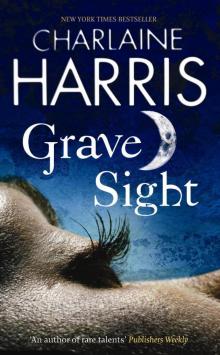 Grave Sight
Grave Sight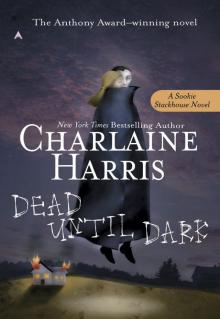 Dead Until Dark
Dead Until Dark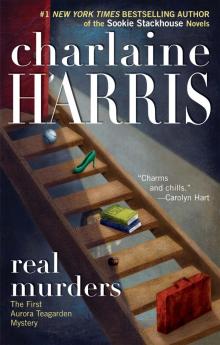 Real Murders
Real Murders Wolfsbane and Mistletoe
Wolfsbane and Mistletoe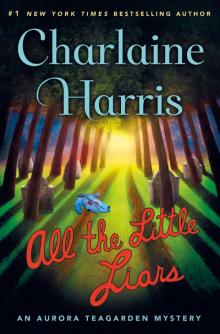 All the Little Liars
All the Little Liars Dead to the World
Dead to the World Club Dead
Club Dead Dead in the Family
Dead in the Family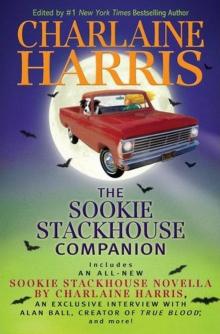 The Sookie Stackhouse Companion
The Sookie Stackhouse Companion All Together Dead
All Together Dead Dead as a Doornail
Dead as a Doornail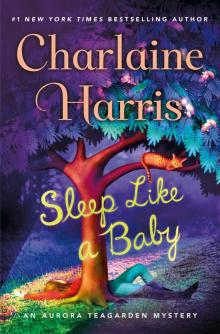 Sleep Like a Baby
Sleep Like a Baby Night Shift
Night Shift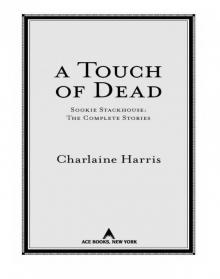 A Touch of Dead
A Touch of Dead Living Dead in Dallas
Living Dead in Dallas Dead Reckoning
Dead Reckoning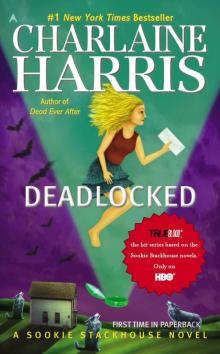 Deadlocked
Deadlocked Dead and Gone
Dead and Gone From Dead to Worse
From Dead to Worse Definitely Dead
Definitely Dead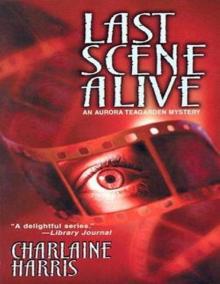 Last Scene Alive
Last Scene Alive Grave Secret
Grave Secret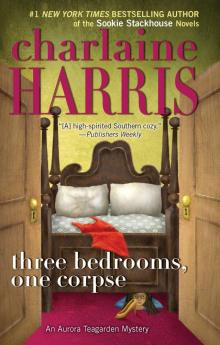 Three Bedrooms, One Corpse
Three Bedrooms, One Corpse The Russian Cage
The Russian Cage Shakespeares Counselor
Shakespeares Counselor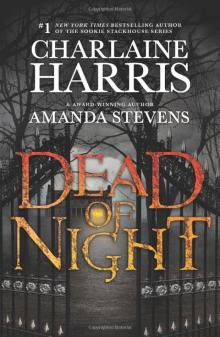 Dead of Night
Dead of Night Shakespeares Trollop
Shakespeares Trollop One Word Answer
One Word Answer Shakespeares Champion
Shakespeares Champion Shakespeares Christmas
Shakespeares Christmas Shakespeares Landlord
Shakespeares Landlord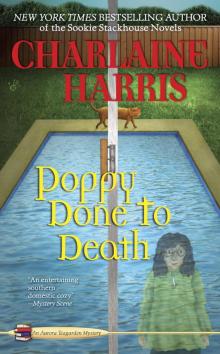 Poppy Done to Death
Poppy Done to Death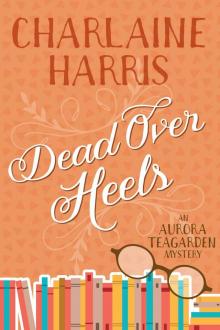 Dead Over Heels
Dead Over Heels An Ice Cold Grave
An Ice Cold Grave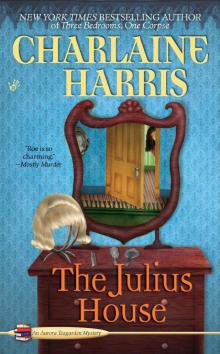 The Julius House
The Julius House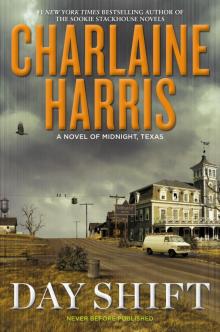 Day Shift
Day Shift A Fool And His Honey
A Fool And His Honey A Longer Fall (Gunnie Rose)
A Longer Fall (Gunnie Rose) The Complete Sookie Stackhouse Stories (Sookie Stackhouse/True Blood)
The Complete Sookie Stackhouse Stories (Sookie Stackhouse/True Blood)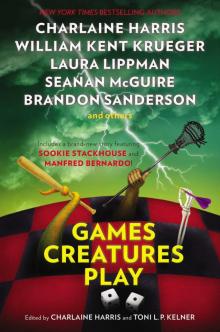 Games Creatures Play
Games Creatures Play Death's Excellent Vacation
Death's Excellent Vacation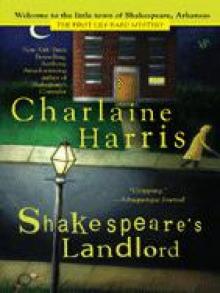 (LB2) Shakespeare's Landlord
(LB2) Shakespeare's Landlord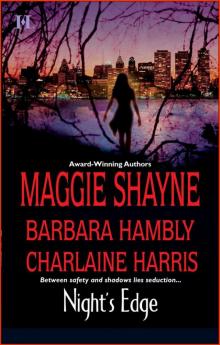 Dancers In The Dark - Night's Edge
Dancers In The Dark - Night's Edge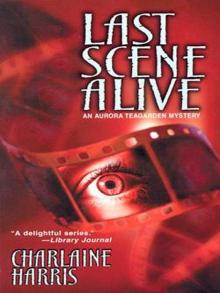 Last Scene Alive at-7
Last Scene Alive at-7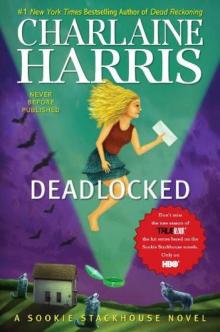 Deadlocked: A Sookie Stackhouse Novel
Deadlocked: A Sookie Stackhouse Novel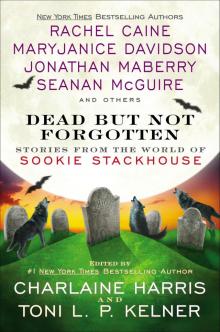 Dead But Not Forgotten
Dead But Not Forgotten (4/10) The Julius House
(4/10) The Julius House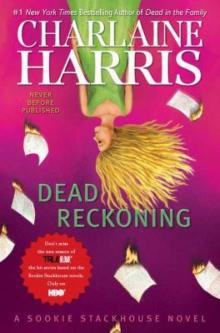 Dead Reckoning: A Sookie Stackhouse Novel
Dead Reckoning: A Sookie Stackhouse Novel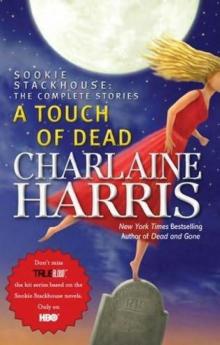 A Touch of Dead (sookie stackhouse (southern vampire))
A Touch of Dead (sookie stackhouse (southern vampire))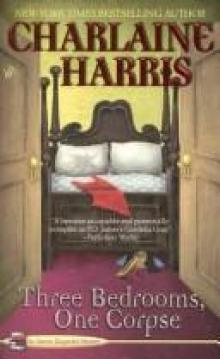 (3T)Three Bedrooms, One Corpse
(3T)Three Bedrooms, One Corpse An Easy Death
An Easy Death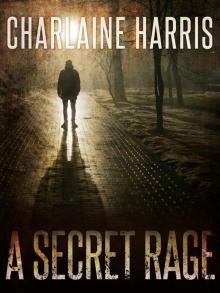 A Secret Rage
A Secret Rage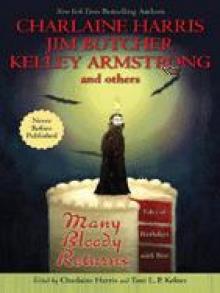 Many Bloody Returns
Many Bloody Returns![Harper Connelly [3] An Ice Cold Grave Read online](http://i1.bookreadfree.com/i/03/25/harper_connelly_3_an_ice_cold_grave_preview.jpg) Harper Connelly [3] An Ice Cold Grave
Harper Connelly [3] An Ice Cold Grave Dancers in the Dark and Layla Steps Up
Dancers in the Dark and Layla Steps Up Small Kingdoms and Other Stories
Small Kingdoms and Other Stories Dead Ever After: A Sookie Stackhouse Novel
Dead Ever After: A Sookie Stackhouse Novel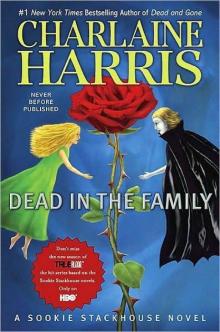 Dead in the Family ss-10
Dead in the Family ss-10 Sweet and Deadly aka Dead Dog
Sweet and Deadly aka Dead Dog An Easy Death (Gunnie Rose #1)
An Easy Death (Gunnie Rose #1) The Complete Sookie Stackhouse Stories
The Complete Sookie Stackhouse Stories Sookie Stackhouse 8-copy Boxed Set
Sookie Stackhouse 8-copy Boxed Set Sweet and Deadly
Sweet and Deadly Crimes by Moonlight
Crimes by Moonlight Dead Ever After: A True Blood Novel
Dead Ever After: A True Blood Novel Dead Ever After ss-13
Dead Ever After ss-13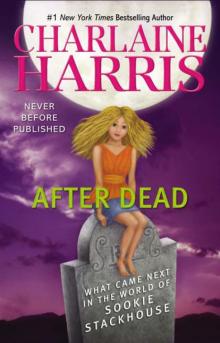 After Dead
After Dead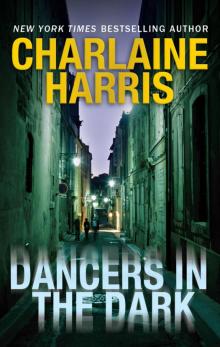 Dancers in the Dark
Dancers in the Dark (LB1) Shakespeare's Champion
(LB1) Shakespeare's Champion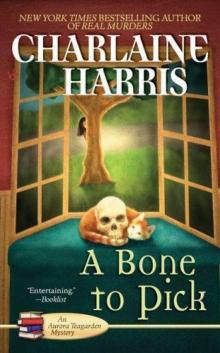 A Bone to Pick (Teagarden Mysteries,2)
A Bone to Pick (Teagarden Mysteries,2)